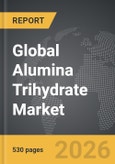Key Insights:
- Market Growth: Understand the significant growth trajectory of the Flame Retardant Application segment, which is expected to reach US$2.8 Billion by 2030 with a CAGR of 6.7%. The Filler Application segment is also set to grow at 5.7% CAGR for the next 7-year period.
- Regional Analysis: Gain insights into the U.S. market, valued at $789.8 Million in 2023, and China, forecasted to grow at an impressive 7.5% CAGR to reach $1.4 Billion by 2030. Discover growth trends in other key regions, including Japan, Canada, Germany, and the Asia-Pacific.
Why You Should Buy This Report:
- Detailed Market Analysis: Access a thorough analysis of the Global Alumina Trihydrate Market, covering all major geographic regions and market segments.
- Competitive Insights: Get an overview of the competitive landscape, including the market presence of major players across different geographies.
- Future Trends and Drivers: Understand the key trends and drivers shaping the future of the Global Alumina Trihydrate Market.
- Actionable Insights: Benefit from actionable insights that can help you identify new revenue opportunities and make strategic business decisions.
Key Questions Answered:
- How is the Global Alumina Trihydrate Market expected to evolve by 2030?
- What are the main drivers and restraints affecting the market?
- Which market segments will grow the most over the forecast period?
- How will market shares for different regions and segments change by 2030?
- Who are the leading players in the market, and what are their prospects?
Report Features:
- Comprehensive Market Data: Independent analysis of annual sales and market forecasts in US$ Million from 2023 to 2030.
- In-Depth Regional Analysis: Detailed insights into key markets, including the U.S., China, Japan, Canada, Europe, Asia-Pacific, Latin America, Middle East, and Africa.
- Company Profiles: Coverage of players such as Showa Denko K.K., Huber Engineered Materials, Alfa Aesar, Akrochem Corporation, Nabaltec AG and more.
- Complimentary Updates: Receive free report updates for one year to keep you informed of the latest market developments.
Some of the 55 companies featured in this Alumina Trihydrate market report include:
- Showa Denko K.K.
- Huber Engineered Materials
- Alfa Aesar
- Akrochem Corporation
- Nabaltec AG
- SCR-Sibelco NV
- TOR Minerals International
- LKAB Minerals AB
- Alteo Holding
- The R.J. Marshall Company
This edition integrates the latest global trade and economic shifts into comprehensive market analysis. Key updates include:
- Tariff and Trade Impact: Insights into global tariff negotiations across 180+ countries, with analysis of supply chain turbulence, sourcing disruptions, and geographic realignment. Special focus on 2025 as a pivotal year for trade tensions, including updated perspectives on the Trump-era tariffs.
- Adjusted Forecasts and Analytics: Revised global and regional market forecasts through 2030, incorporating tariff effects, economic uncertainty, and structural changes in globalization. Includes historical analysis from 2015 to 2023.
- Strategic Market Dynamics: Evaluation of revised market prospects, regional outlooks, and key economic indicators such as population and urbanization trends.
- Innovation & Technology Trends: Latest developments in product and process innovation, emerging technologies, and key industry drivers shaping the competitive landscape.
- Competitive Intelligence: Updated global market share estimates for 2025, competitive positioning of major players (Strong/Active/Niche/Trivial), and refined focus on leading global brands and core players.
- Expert Insight & Commentary: Strategic analysis from economists, trade experts, and domain specialists to contextualize market shifts and identify emerging opportunities.
Table of Contents
Companies Mentioned (Partial List)
A selection of companies mentioned in this report includes, but is not limited to:
- Showa Denko K.K.
- Huber Engineered Materials
- Alfa Aesar
- Akrochem Corporation
- Nabaltec AG
- SCR-Sibelco NV
- TOR Minerals International
- LKAB Minerals AB
- Alteo Holding
- The R.J. Marshall Company
Table Information
| Report Attribute | Details |
|---|---|
| No. of Pages | 530 |
| Published | February 2026 |
| Forecast Period | 2023 - 2030 |
| Estimated Market Value ( USD | $ 4 Billion |
| Forecasted Market Value ( USD | $ 6 Billion |
| Compound Annual Growth Rate | 6.0% |
| Regions Covered | Global |









